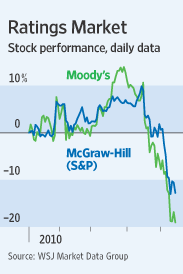I have been a long standing critic of the Ratings Agencies. Recall this got me into a little hot water with my publisher — the S&P owned McGraw Hill.
I agree with Nobel prize winner Joseph Stiglitz, who called the Ratings Agencies one of the “key culprits” of the credit crisis.
So you can imagine how thrilled I was that Senator Al Franken’s (!?!) amendment on the Ratings Agencies passed, over the opposition of Banking Committee Chairman Chris Dodd:
“The Senate approved a provision that would thrust the government into the process of determining who rates complex bond deals, in a move to end alleged conflicts of interest blamed by some for worsening the financial crisis.
The 64-35 vote Thursday represents one of the strongest moves yet by Congress to change how business is done on Wall Street. The amendment aims to resolve what’s considered one of the thorniest problems in financial markets: Bond issuers choose ratings agencies and pay for ratings, meaning raters’ revenues depend on the very firms whose bonds they are asked to judge.
Under the new provision, the Securities and Exchange Commission would instead establish and oversee a powerful credit-rating board that would act as a middleman between issuers seeking ratings and the Ratings Agencies. The board would select which agency provides the “initial rating” for certain securities known as structured bonds.
Critics of the status quo say the issuer-pay model led to inflated ratings in the housing boom, particularly of those securities backed by mortgages. Many bonds rated triple-A ended up getting downgraded to junk, unleashing mayhem in the financial system. Congress has drubbed the Ratings Agencies for being too cozy with the banks that bring them business and too focused on market share rather than independent analysis.”
I have repeatedly noted that the Ratings Agencies have been prime contributors to the credit bubble and economic crisis. I have written that they are corrupt enterprises that whored themselves out to the highest bidder. I have suggested that their privileged status is an anachronism that should be eliminated. Lastly, I believe the entire ratings space should be opened up to competition.
The Calpers suit is potentially a game changer. The one thing I haven’t written — but have discussed with hedge funds clients — I think Moody’s could be a zero. Their potential liability is enormous, and their future business model is in doubt. S&P has other business lines (my experience with McGraw-Hill was less than lovely) but they too have run into big trouble.
>
Previously:
Blaming Moody’s (December 7th, 2008)
http://www.ritholtz.com/blog/2008/12/blaming-moodys/
Rating Agencies Must Defend AAA Junk in Court (September 3rd, 2009)
http://www.ritholtz.com/blog/2009/09/rating-agencies-must-defend-aaa-junk-in-court/
FreeRisk: Who Needs Moody’s ? (June 16th, 2009)
http://www.ritholtz.com/blog/2009/06/freerisk-who-needs-moodys/
Credit Rating Firms: Worthless in a Bull Market, Damaging in a Bear Market (February 25th, 2010)
http://www.ritholtz.com/blog/2010/02/credit-rating-firms-worthless/
Here are the original and changed passages of Bailout Nation relative to Rating Agencies:
• Original
• Revised
Source:
Rating Agencies Face Curbs
AARON LUCCHETTI, SERENA NG and GREG HITT
WSJ, May 12, 2010
http://online.wsj.com/article/SB10001424052748704635204575242472908973624.html



What's been said:
Discussions found on the web: